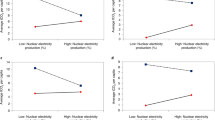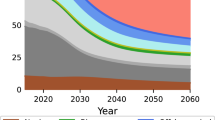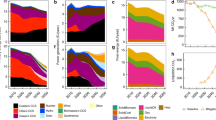Abstract
Climate action is an integral part of the Sustainable Development Goals agreed by all 193 United Nations member states. We show that lifting European Union import tariffs on some inputs used to produce renewable energy could lessen Europe’s carbon footprint, improving the likelihood that the region meets the targets of the Paris Agreement and the Sustainable Development Goals. The results of a panel regression analysis with detailed product-level data indicate that eliminating the tariffs on 11 intermediate inputs may help to offset fossil fuel consumption driven by growth in economic activity. Abolishing the tariff on a single product—cylindrical roller bearings, used in the manufacturing of wind turbines—would probably bring the most benefit, cancelling out the expansion in demand for fossil fuels otherwise expected from 1–4% European gross domestic product growth (46,000–236,000 tonnes of oil equivalent per member state).
This is a preview of subscription content, access via your institution
Access options
Access Nature and 54 other Nature Portfolio journals
Get Nature+, our best-value online-access subscription
$29.99 / 30 days
cancel any time
Subscribe to this journal
Receive 12 digital issues and online access to articles
$119.00 per year
only $9.92 per issue
Buy this article
- Purchase on Springer Link
- Instant access to full article PDF
Prices may be subject to local taxes which are calculated during checkout
Similar content being viewed by others
References
Jovanović, M. Heating Up (International Monetary Fund, 2017); http://www.imf.org/external/pubs/ft/fandd/2017/12/picture.htm
Sadorsky, P. Renewable energy consumption and income in emerging economies. Energy Policy 37, 4021–4028 (2009).
Lomborg, B. Climate-change policies can be punishing for the poor. The Wall Street Journal (4 January 2018); https://www.wsj.com/articles/climate-change-policies-can-be-punishing-for-the-poor-1515110743
REN21 Renewables 2017: Global Status Report (2017); http://www.ren21.net/gsr-2017/
Perspectives for the Energy Transition: Investment Needs for a Low-Carbon Energy System (International Renewable Energy Agency, 2018); http://www.irena.org/publications/2017/Mar/Perspectives-for-the-energy-transition-Investment-needs-for-a-low-carbon-energy-system
Ziegler, L., Gonzalez, E., Rubert, T., Smolka, U. & Melero, J. J. Lifetime extension of onshore wind turbines: a review covering Germany, Spain, Denmark, and the UK. Renew. Sustain. Energy Rev. 82, 1261–1271 (2018).
Sinn, H. W. Buffering volatility: a study on the limits of Germany’s energy revolution. Eur. Econ. Rev. 99, 130–150 (2017).
Cherp, A., Vinichenko, V., Jewell, J., Suzuki, M. & Antal, M. Comparing electricity transitions: a historical analysis of nuclear, wind and solar power in Germany and Japan. Energy Policy 101, 612–628 (2017).
Fedoseeva, S. & Zeidan, R. How (a)symmetric is the response of import demand to changes in its determinants? Evidence from European energy imports. Energy Econ. 69, 379–394 (2018).
Grafström, J., Söderholm, P., Gawel, E., Lehmann, P. & Strunz, S. Knowledge Accumulation from Public Renewable Energy R&D in the European Union: Converging or Diverging Trends? (UFZ, 2017).
Strunz, S., Gawel, E., Lehmann, P. & Söderholm, P. Policy convergence as a multifaceted concept: the case of renewable energy policies in the European Union. J. Public Policy 37, 1–27 (2017).
Report on the Implementation of the Trade Policy Strategy Trade for All (European Commission, 2017); http://eur-lex.europa.eu/legal-content/EN/TXT/PDF/?uri=CELEX:52017DC0491&from=EN
Nemet, G. & Baker, E. Demand subsidies versus R&D: comparing the uncertain impacts of policy on a pre-commercial low-carbon energy technology. Energy J. 30, 49–80 (2009).
Kim, K. & Kim, Y. Role of policy in innovation and international trade of renewable energy technology: empirical study of solar PV and wind power technology. Renew. Sustain. Energy Rev. 44, 717–727 (2015).
Aïssa, M. S. B., Jebli, M. B. & Youssef, S. B. Output, renewable energy consumption and trade in Africa. Energy Policy 66, 11–18 (2014).
Aubin, C. Accelerating Africa’s energy transition. Project Syndicate (11 January 2018); https://www.project-syndicate.org/commentary/africa-renewables-solar-economic-incentives-by-charlotte-aubin-2018-01
Global Energy & CO 2 Status Report 2017 (International Energy Agency, 2018); http://www.iea.org/publications/freepublications/publication/GECO2017.pdf
Victor, P. Questioning economic growth. Nature 468, 370–371 (2010).
The Millennium Development Goals Report 2015 (United Nations, 2015); http://www.undp.org/content/dam/undp/library/MDG/english/UNDP_MDG_Report_2015.pdf
Baldwin, R. The World Trade Organization and the future of multilateralism. J. Econ. Perspect. 30, 95–116 (2016).
Mayer, K. With the Stroke of a pen: Executive Orders and Presidential Power (Princeton Univ Press, Princeton, 2002).
Celik, L., Karabay, B. & McLaren, J. When is it optimal to delegate: the theory of fast-track authority. Am. Econ. J. Microecon. 7, 347–389 (2015).
Stern, N. The Economics of Climate Change: The Stern Review (Cambridge Univ. Press, Cambridge, 2006).
Tol, R. S. J. The structure of the climate debate. Energy Policy 104, 431–438 (2017).
Ben Sita, B., Marrouch, W. & Abosedra, S. Short-run price and income elasticity of gasoline demand: evidence from Lebanon. Energy Policy 46, 109–115 (2012).
Adewuyi, A. O. Determinants of import demand for non-renewable energy (petroleum) products: empirical evidence from Nigeria. Energy Policy 95, 73–93 (2016).
Moore, A. Demand elasticity of oil in Barbados. Energy Policy 39, 3515–3519 (2011).
Adeyemi, O. I., Broadstock, D. C., Chitnis, M., Hunt, L. C. & Judge, G. Asymmetric price responses and the underlying energy demand trend: are they substitutes or complements? Evidence from modelling OECD aggregate energy demand. Energy Econ. 32, 1157–1164 (2010).
Wind, I. HS Codes and the Renewable Energy Sector (ICTSD, 2009); https://www.ictsd.org/downloads/2010/01/hs-codes-and-the-renewable-energy-sector.pdf
Author information
Authors and Affiliations
Contributions
R.Z. outlined the theoretical background of the study. S.F. designed and performed the empirical analysis. Both authors wrote the manuscript.
Corresponding author
Ethics declarations
Competing interests
The authors declare no competing interests.
Additional information
Publisher’s note: Springer Nature remains neutral with regard to jurisdictional claims in published maps and institutional affiliations.
Supplementary information
Supplementary Data Set
Supplementary Tables 1-4
Rights and permissions
About this article
Cite this article
Fedoseeva, S., Zeidan, R. Tariff reduction on renewables inputs for European decarbonization. Nat Sustain 1, 436–440 (2018). https://doi.org/10.1038/s41893-018-0113-1
Received:
Accepted:
Published:
Issue Date:
DOI: https://doi.org/10.1038/s41893-018-0113-1
This article is cited by
-
Efficient osmosis-powered production of green hydrogen
Nature Sustainability (2024)
-
Speeding up the energy transition
Nature Sustainability (2018)



